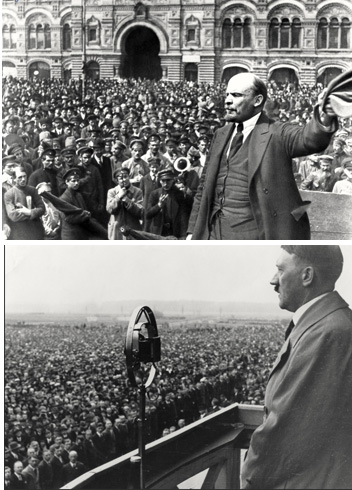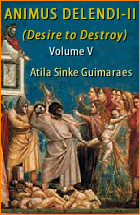Social-Political Issues
 |
 |
 |
 |
 |
 |
 |
The Psychology of Totalitarianism – II
Historical Context for Mass Hypnosis
Note from the Editor: Although we agree with the general thesis of Prof. Mattias Desmet, which is being presented in this series, we disagree with his historical example of the Crusades as a case of mass hypnosis. The Crusades were born from a noble desire based on reason and inspired by the Catholic Faith to liberate the Sepulcher of Christ from the hands of profaners. Most definitely not from public anxiety regarding the life of Catholics in Europe as presented by Prof. Desmet. - A.S.G.It is easier to understand what mass formation is if you consider it as mass hypnosis, because they’re not merely similar, they’re identical, Desmet says. Mass formation is a kind of hypnosis that emerges when specific conditions are met. And, disturbingly, these conditions, and the hypnotic trance that emerges, almost always precede the rise of totalitarian systems.

Totalitarian States are based on mass hypnosis
Totalitarianism, on the other hand, arises from a very different psychological mechanism. Interestingly, the totalitarian state did not actually exist before the 20th century. It’s a relatively new phenomenon, and it’s based on mass formation or mass hypnosis.
The conditions for this mass hypnotic state (listed below) were first met just before the emergence of the Soviet Union and Nazi Germany, so that’s our historical context. These conditions were again met just before the COVID crisis. What we’re seeing now is a different kind of totalitarianism, largely due to technological advancements that have created extremely effective tools to subconsciously influence the public.
We now have very sophisticated tools with which to hypnotize far larger masses of people than they could in earlier times. But while our current-day totalitarianism is global rather than regional, and the information war more sophisticated than anything the Soviets or Nazi’s could muster, the basic psychological dynamics are still identical.
Understanding hypnosis
So, what are those psychological dynamics? “Mass formation” is a clinical term that in layman’s jargon could simply be translated as a kind of mass hypnosis, which can occur once certain conditions are fulfilled.
When you are being hypnotized, the first thing the hypnotist will do is to detach or withdraw your attention from the reality or environment around you. Then, through his hypnotic suggestion – usually a very simple narrative or sentence stated out loud – the hypnotist will focus your full attention on a single point, for instance, a moving pendulum or just his voice.
From the perspective of the hypnotized person, it will seem as though reality has vanished. An extreme example of this is the use of hypnosis to make people insensitive to pain during surgery. In that situation, the patient’s mental focus is so narrow and intense that they don’t notice that their body is being cut into.

Wearing masks to avoid Covid became a symptom of global hypnosis - top, the United Sates; bottom, Japan
People can be killed for not wearing a mask and the hypnotized won’t raise an eyebrow. Children can die from starvation and friends can commit suicide from financial desperation – none of it will have a psychological impact on the hypnotized because to them, the plight of others does not register. A perfect example of this psychological blinding to reality is how COVID jab deaths and injuries are simply unrecognized and not even considered to be causal.
People will get the shot, suffer massive injuries, and say, “Thank goodness I got the shot or it would have been so much worse.” They cannot conceive the possibility that they were injured by the shot. I’ve even seen people express gratitude for the shot when someone they supposedly loved died within hours or days of getting it! It’s just mindboggling. The psychological dynamics of hypnosis does explain this irrational and otherwise incomprehensible behavior, but it’s still quite surreal.
Desmet says: “Even while I know the mechanisms at work, I’m still baffled every time it happens. I almost can’t believe what I see. I know someone whose husband died a few days after the vaccine, during his sleep, from a heart attack.
And I thought, ‘Now she will open her eyes and wake up.’ Not at all. She just continued in the same fanatic way – even more fanatic – talking about how happy we should be because we have this vaccine. Unbelievable, yes.”
Psychological roots of mass formation
As mentioned, mass formation, or mass hypnosis, can occur when certain psychological conditions are present in a large-enough portion of society. The four central conditions that need to exist in order for mass formation to arise are:
- Widespread loneliness and lack of social bonding, which leads to:
- Experiencing life as meaningless, purposeless and senseless, and/or being faced with persistent circumstances that do
not make rational sense, which leads to:
- Widespread free-floating anxiety and discontent (anxiety/discontent that has no apparent or distinct cause), which leads to:
- Widespread free-floating frustration and aggression (frustration and aggression have no discernible cause), which results in feeling out of control.
Once a large-enough portion of society feels anxious and out of control, that society becomes highly vulnerable to mass hypnosis. Desmet explains:
“Social isolation, lack of meaning, free floating anxiety, frustration and aggression are highly aversive because if people feel anxious, without knowing what they feel anxious for, they typically feel out of control. They feel they cannot protect themselves from their anxiety.

Covid's narrative spread by the media & the establishment outlets followed the rules of mass hypnosis
And, there might be a huge willingness to participate in a strategy to deal with the object of anxiety, no matter how absurd the strategy is. So, even if it is clear from the beginning – for everyone who wants to see it – that the strategy to deal with the object of anxiety might claim many more victims than the object of anxiety itself … even then, there might be this huge willingness to participate in a strategy to deal with the object of anxiety.
That is the first step of every major mechanism of mass formation. Whether it concerned the Crusades, or the witch hunts, or the French Revolution, or the beginning of the Soviet Union or Nazi Germany, we see the same mechanism, time and time again.
There is a lot of free-floating anxiety. Someone provides a narrative that indicates an object of anxiety and a strategy to deal with it. And then all the anxiety connects to the [proposed] object of anxiety.
People participate in a strategy to deal with the object of anxiety that yields a first important psychological advantage, and from then on people have the impression that they can control their anxiety. It’s connected to an object and they have a strategy to deal with it.”
TIA divided the article in installments
Continued

Posted August 17, 2022
______________________
______________________
 Volume I |
 Volume II |
 Volume III |
 Volume IV |
 Volume V |
 Volume VI |
 Volume VII |
 Volume VIII |
 Volume IX |
 Volume X |
 Volume XI |
 Special Edition |


